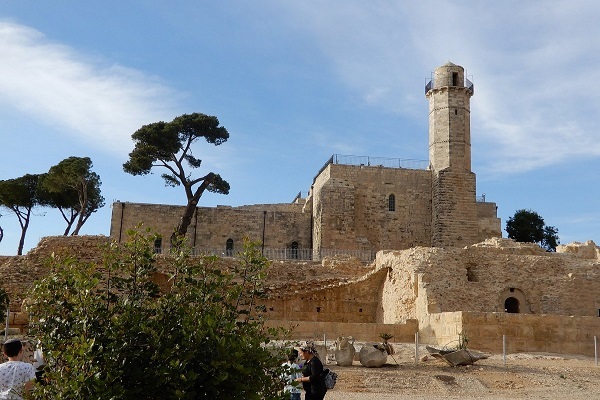AhlulBayt News Agency: The Israeli regime has reportedly annexed the historical Palestinian site Nebi Samuel, located in the occupied West Bank and housing a church, mosque and a synagogue, under the cover of a "national park".
Israel's illegal takeover of the site and the subjugation of the indigenous Palestinian residents were revealed by Haaretz in a report which exposed one of the countless ways in which the occupation state has ethnically cleansed the indigenous Muslims and Christian Palestinian communities from historic Palestine.
Designating Palestinian towns and villages razed to the ground as parks during Israel's first phase of ethnic cleansing, is one of the most successful means of colonization deployed by the occupation regime. During the Nakba in 1948 when over 750,000 Palestinians-three quarters of indigenous Palestinian population – more than 600 villages and towns were razed to the ground. Many of the sites of ethnic cleansing and cultural erasure have been converted into parks.
A similar fate appears to be awaiting Palestinian residents of Nebi Samuel. The area is said to contain the tomb of the biblical Prophet Samuel. Thousands of years of history is buried there. The site is sacred to Jews, to Christians and to Muslim. There's the mosque holding prayers several times a day, and at its entrance is the Crusader church.
Until Israel's occupation of the site in 1967, the mosque and tomb had been surrounded by the village of Nebi Samuel. The village was home to over 1,000 residents. Most fled during the Six Day War which Palestinians describe as the second cycle of ethnic cleansing by Israel. Palestinian residents of the village were prevented from returning to their homes.
Israel's plan for the takeover of the sensitive site took concrete shape in 1971 when the regime’s prime minister Golda Meir ordered the military to demolish the village's 46 homes. State Archives documents show that the homes were demolished in order to build a Jewish only settlement of some 1,000 villas for "Jews of means", according to Haaretz. However, the planned settlement never materialized apparently because environmental organizations opposed the construction, which they said would be a blight on the landscape. It also became clear that the area was private Palestinian property. Then-attorney general Meir Shamgar explained at the time, in 1973, that "If the owners of the land are present, it cannot be appropriated." Those present are the residents of Nebi Samuel, who remained living near the site.
Twenty-two years later, two weeks before the signing of the Oslo II Accords, Israeli leaders decided it was time to create facts on the ground, meaning that steps are to be undertaken to ensure that it is impossible to reverse Israel's illegal annexation. Nebi Samuel was declared one large park. As an occupying power Israel has no right to declare territory under military control as a "national park".
"Creating the national park was an admission that the land couldn't be taken over," Israeli journalist Amira Hass told Haaretz, explaining that a ruse was devised to bypass restrictions. "When they recognized the fact that the area couldn't be taken over and built on, they pulled a political trick, making it so nobody could build there. They effectively created a Disneyland there and even took off the Nebi Samuel sign. They created another Jewish enclave in the West Bank."
Palestinian residents that live inside the "park" can do virtually nothing to improve their lives. They can't build or develop anything. They can't plant trees, lay sewage lines, or put up a fence. Since the illegal Separation Wall was built two decades ago, the residents have been completely shut off. The fences of the site separate them from the rest of the West Bank.
Describing the plight of the Palestinians in the Nabi Samuel area, Professor Idan Landau is reported as saying: "The 250 residents of the village are living in an intolerable cage. They are cut off from the West Bank by the separation barrier, as well as the apartheid road."
/129
1 June 2023 - 08:09
News ID: 1370281

The Israeli regime has reportedly annexed the historical Palestinian site Nebi Samuel, located in the occupied West Bank and housing a church, mosque and a synagogue, under the cover of a "national park".
